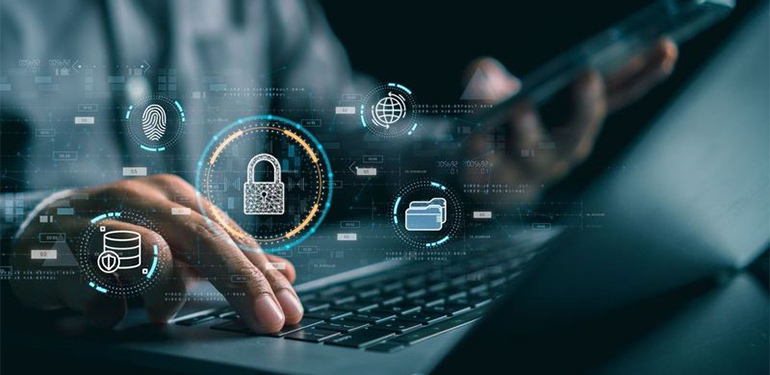
- 17 novembra, 2025
- admin
- 0
Security in the Office Environment – Protecting Data and Processes in the Digital Age
In an era where digitalization has become the foundation of every business, cybersecurity threats are increasingly noticeable. As business processes shift to the digital realm, companies face new challenges, particularly in data protection. While digitalization brings numerous advantages, such as greater productivity and easy access to information, it also increases the risks of cyberattacks. In this article, we will explore how companies and office environments can protect their data from attacks and implement best practices for ensuring cybersecurity.
Why is Cybersecurity Critical in the Office Environment?
Modern businesses are increasingly dependent on digital systems, cloud services, and various applications. This, in turn, increases the exposure of their data. Malicious activities, such as phishing attacks, ransomware, and insider threats, are becoming more sophisticated. Inadequate data protection can result in serious consequences, such as intellectual property theft, loss of customer trust, or financial losses.
Key Measures for Data Protection in the Office Environment
- Employee Education
One of the most important lines of defense is employee education. Most cyberattacks stem from human error. Employees must be aware of threats like phishing and be able to recognize suspicious email addresses, links, or attachments. Regular training is crucial to preventing mistakes. - Use of Strong Passwords and Multi-Factor Authentication (MFA)
Strong and unique passwords are the foundation of protection. To further enhance security, it is recommended that companies implement multi-factor authentication (MFA), which adds additional barriers for attackers trying to access accounts, even if they have the passwords. - Regular Software Updates
Outdated software contains security vulnerabilities that attackers often exploit. Companies must ensure that all software is up-to-date and protected with the latest security patches. - Implementation of Security Policies and Access Control
Limiting access to sensitive data only to those who need it for their tasks is essential. Companies must regularly monitor activities and conduct access audits to prevent potential insider threats. - Strengthening Network Security with Firewalls and Encryption
Firewalls, data encryption, and protection from external attacks are key to maintaining network security. Especially, encrypting sensitive data ensures that, in the case of a breach, attackers will have difficulty accessing the information. - Regular Backups
In the event of a ransomware attack, it is crucial for companies to regularly back up their data. This ensures that data can be restored even in the case of an attack. - Ensuring Security in Remote Work
Since remote work has become a staple, it is necessary to implement proper security measures, such as secure VPNs, protected access to cloud services, and monitoring of employee activity, to prevent potential attacks.
Risks When Working with AI Agents: Data Leakage
The use of Artificial Intelligence (AI) in office environments has become an everyday practice. AI helps in data analysis, task automation, and even customer interactions. However, it also introduces new security challenges, particularly when processing sensitive data.
Known Risks When Working with AI Agents:
- Data Leakage from Mishandling Sensitive Information
AI systems that process personal, financial, or business data can unintentionally disclose confidential information if not properly protected. For instance, AI agents in customer communication, such as chatbots, may incorrectly store or transmit sensitive data. - Improper Data Processing – Misinterpretation of Information
AI tools that analyze documents or contracts may mishandle or misinterpret sensitive information. This can lead to the disclosure of data that was meant for restricted circulation within the company. - Model Training Errors – Sensitive Information in AI Predictions
AI systems that “learn” from data can inadvertently embed sensitive information in their predictions. For example, an AI system for analyzing medical images or financial data may include personal data in its predictions that were not properly protected.
Preventing Data Leakage When Working with AI:
- Encryption of Data Throughout Its Lifecycle
Data processed by AI agents must be encrypted both at rest and in transit to reduce the risk of leakage in the event of a breach. - Privacy by Design
AI systems should be designed from the outset with privacy protection in mind. This means that only essential data should be processed and anonymization or pseudonymization techniques should be applied. - Transparency and Monitoring of AI Processes
Companies must have clear oversight of the data that AI agents process and allow for regular reviews and monitoring of these agents’ activities to prevent potential security risks. - Employee Education and Awareness
Employees must be aware of the risks associated with AI and understand how to safely handle sensitive data and interact with AI agents that process confidential information.
Cybersecurity is, in fact, an Investment in the Future
Cybersecurity in the office environment is not just a technical task, but a critical investment in the long-term stability of the business. By adopting appropriate protective measures for data – whether working with traditional systems or advanced AI agents – companies reduce the risk of attacks and maintain the confidentiality of their information. In a world where data is the most valuable asset, security must remain a top priority for every organization.
With proper data protection, employee education, and monitoring of AI processes, companies can not only reduce the risk of security breaches but also ensure that new tools, such as AI agents, are used safely and responsibly. Cybersecurity is an ongoing process that must adapt to new threats, but it can be decisive for the success of a company in the digital age.
At Rosoft d.o.o., we have been dealing with cybersecurity and related fields for many years. If you have any questions, feel free to contact us, and we will be happy to assist you.
